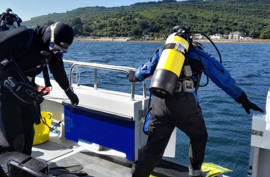How to achieve oil separator compliance
Published: 8 July 2021
By: Shirley Miles, Head of Environmental Protection Services
There has recently been an increased number of pollution incidents where failed separators have been the cause or has exacerbated a loss of containment and regulators are clamping down on poorly maintained and non-compliant operations.
Petroleum hydrocarbons can cause serious pollution. Anyone allowing these substances to pollute groundwater or surface water risks penalties under CAR (2005) and significant remediation costs.
Pollution risks can arise from either above ground or below ground storage of hydrocarbons and from associated activities such as delivery and fuel dispensing. The Water Environment Oil Storage (Scotland) Regulations 2006 are intended to prevent pollution of the water environment from above ground storage tanks.
The Scottish Environment Protection Agency (SEPA) has the power to prohibit or control the storage of hydrocarbons which might risk polluting the water environment. These agencies also have powers to prosecute where pollution has occurred.
To reduce the risk of a pollution incident and potential prosecution it is critical that operators manage separators in line with current standards and good practice guidance.
Current standards and relevant good practice guidance
The onus is on operators to demonstrate compliance with regulation, current standards, and good practice to reduce the risk of a pollution incident and any subsequent enforcement action.
BS EN 858-2:2003 and PPG 3* highlight that separators should:
- Be fitted with an automatic warning device/high level alarm
- Be serviced and maintained as a minimum on a 6 monthly basis
- Be subject to a maximum interval of a 5 yearly integrity test
- Have full service and maintenance records available for inspection
Why is separator servicing important?
Regular separator maintenance is essential to keep all pollution prevention equipment working at optimum efficiency, safeguarding businesses that handle and store oil or other hazardous materials. Sites such as petrol station forecourts, major car parks and hauliers’ yards all have separators that need regular servicing to prevent pollution to the environment.
Separator maintenance, including separator cleaning, is essential for providing the information needed for service log scrutiny during environmental inspections. Pollution Prevention Guidelines state that separators should be serviced at least twice a year and in accordance with the manufacturer’s instructions. We offer one to five-year service contracts for separator maintenance to suit your needs.
Separators are designed to trap harmful substances before they enter the surrounding area. If filters become blocked, apart from the pollution risk, flooding can also be a problem as water cannot run off-site. As part of the maintenance process we will replace blocked filters.
Our CCTV camera survey vehicles are used to analyse separator pipes, quickly identifying blockages, surface cracks, fractures, displacements and collapsed systems. Our CCTV inspection and reporting equipment is ATEX approved for safe use on Zone 2 hazardous areas, ideal for forecourt works.
What are separator alarms?
A separator alarm system monitors oil, silt and liquid levels within underground separators, ensuring they are operating correctly and preventing pollutants.
A separator alarm system is crucial for maintaining a separator system. Proper maintenance will reduce waste management costs and help avoid an overflow which would incur further clean-up costs.
We have the capability to specify, supply, install and service oil separator alarm systems and provide the necessary services to ensure your alarms are working properly.
Why it is important to keep your separators compliant?
Cutting corners with your separator maintenance could have huge environmental implications which could result in more expense in the long run.
The implications aren’t just environmental, there is the legal, financial and reputational damage that could ensue if you fail to adequately protect the environment.
A spill of a substance capable of harming the environment could result in a criminal prosecution, and it could also lead to nuisance or negligence claims from persons affected by the spill.
The cost to remediate the environment following a pollution incident can pale into insignificance when you consider the cost of the fines imposed. There has been a marked increase in the level of fines over the last decade, especially for large companies. In certain circumstances, senior officers of offending businesses have been held personally liable.
Finally, the reputational damage from a pollution event and ensuing investigations may be as much a concern for businesses as the legal consequences.
With regular servicing and monitoring, we ensure your separators remain compliant, protecting the environment, your operation, and your finances.
More from our Knowledge Hub
 News
NewsDemystifying the new biodiversity net gain legislation
 Case study
Case studyBlue carbon habitat suitability assessments in Scotland as part of Carbon Neutral Islands project
 Insights
InsightsChanges to ESOS reporting system and compliance notification deadline extended to 6 August 2024
 Insights
InsightsEverything you need to know about ESOS phase 3
Keep your business compliant and protect the environment while reducing the risk of operational downtime
Find out how Adler and Allan reduce your risk and support you on your journey to Net-Zero through the management and maintenance of assets.
Contact our experts

